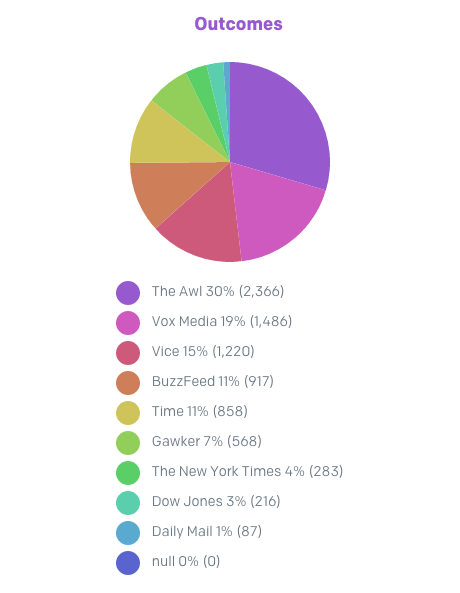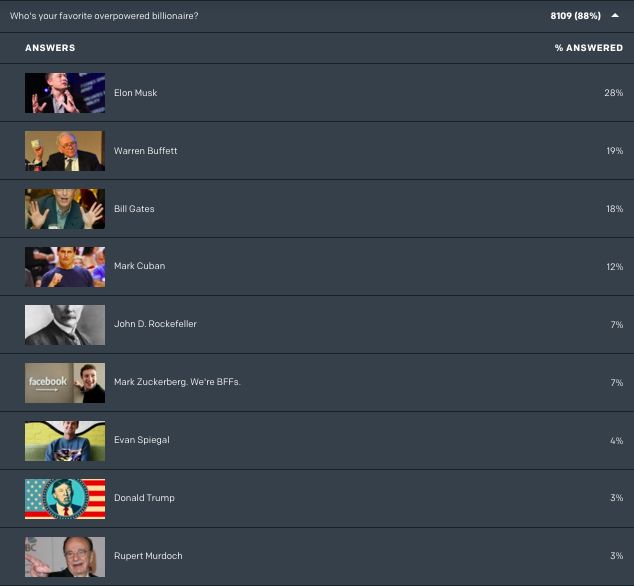Media
5 Hasty Conclusions From Quizzes I Made About the Media Industry
I’ve been writing professionally for a few years, and the only article I wrote that legitimately went “viral” isn’t an article at all—it’s a quiz.
That’s fine, because it’s a pretty amazing quiz, mostly thanks to some pitch-perfect GIFs and images scrounged up by our former editorial intern Julia Schur. This, for example, was the visual spread for “If you could describe yourself in one word, it would be…”
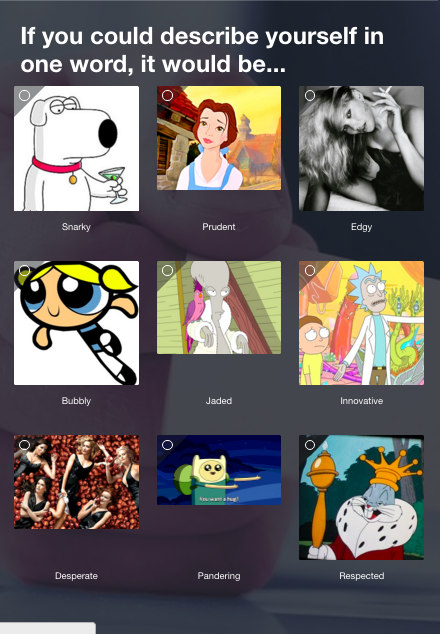
The premise of the quiz was pretty simple: By asking a few simple but telling questions like “What was your favorite subject in high school?” and “Who is your favorite overpowered billionaire?” the quiz would determine which media company that person embodied. It quickly took off a day or two after it was posted, by which I mean some well-known media professionals started taking and tweeting about it.
My result from this what content company are you test (apparently I made the right deal!): http://t.co/TExHInVOJW pic.twitter.com/3wdcX0Cc8w
— Kara Swisher (@karaswisher) July 24, 2015
um I legit got my own company. I got “Vox Media” on “Quiz: What Media Company Are You?” What about you? http://t.co/hE2jPxbMqx
— nilay patel (@reckless) July 23, 2015
I got “Gawker” on “Quiz: What Media Company Are You?”. Still can’t quite believe I’ve never actually worked there. http://t.co/Din9MRZED3
— Felix Salmon (@felixsalmon) July 23, 2015
I later learned that the “virality” started when someone posted the quiz in BuzzFeed’s Slack, which, anecdotally, shows the importance of dark traffic and influencers. In the end, propelled by those influencers, the quiz was taken over 9,000 times.
As you can see, The Awl was the most likely media company for media types “to be.” That’s not particularly surprising, since The Awl is a small but highly influential publication among folks in the media industry. The Verge wrote a profile of the publication last year that was subtitled, “Why are the most important people in media reading The Awl?” which gives you an idea of its outsized influence.
Since then, I’ve done two other quizzes relating to the media industry: “Can You Guess the Publisher by the Headline?” and “Can You Guess the Publisher by the Homepage?” Unfortunately, neither of those went viral.
All three, however, revealed interesting takeaways about the media industry.[note]Considering these are informal quizzes rather than studies with clear methodologies, I’m taking them with a grain of salt, and so should you.[/note]
People struggle to tell old-school media headlines apart

Newspapers and legacy print publications have a thing for interjectory commas. It’s the kind of headline you’ll almost never see on a site like BuzzFeed or Vox, and for good reason since they sound incredibly stodgy.
Of course, headlines were so similar in print because space was limited; creative comma use was necessary. Now, those titles bring these publishers old-school charm and a sense of seriousness.
But as the quiz result suggests, they aren’t very distinct. Bloomberg, The New York Times, The Washington Post, and The Wall Street Journal are all in competition for similar eyes. The last thing they want is for their brands to blur together.
Certain media brands have very distinct headline styles


While Vice and BuzzFeed’s unique headline structures have led to plenty of parodies, they are also easy to identify in a lineup. The two sites had by far the highest percentages of correct answers.
To demonstrate just how pervasive BuzzFeed’s headline style is, 34 percent of people thought Cosmopolitan’s headline (“This Photo of a Dad Kissing His Baby Looks Like a Butt Hole and the Internet Can’t Even”) was BuzzFeed. Only 13 percent correctly selected Cosmo.
Not all new media companies did so well. Only 21 percent of people knew “Will Obama Shapeshift Into His True Reptilian Vampire Form Tonight at His Final State of the Union? Perhaps! If So, _______ Will Liveblog It!” came from Gawker. (Sixty-one percent thought it was The Onion, which, to be fair, is understandable.)
Breitbart came in dead last at 12 percent, though I admit that the headline (“Five Ways the Social Justice Movement Can Restore Its Credibility in 2016”) was purposefully tricky.
BuzzFeed, The New Yorker, and HuffPo have the most recognizable homepages
Of the 12 sites I included in “Can You Guess the Publisher by the Homepage?” quiz, these three were tops at 84, 82, and 76 percent correct, respectively.
When you look at the homepages, it’s easy to see why.
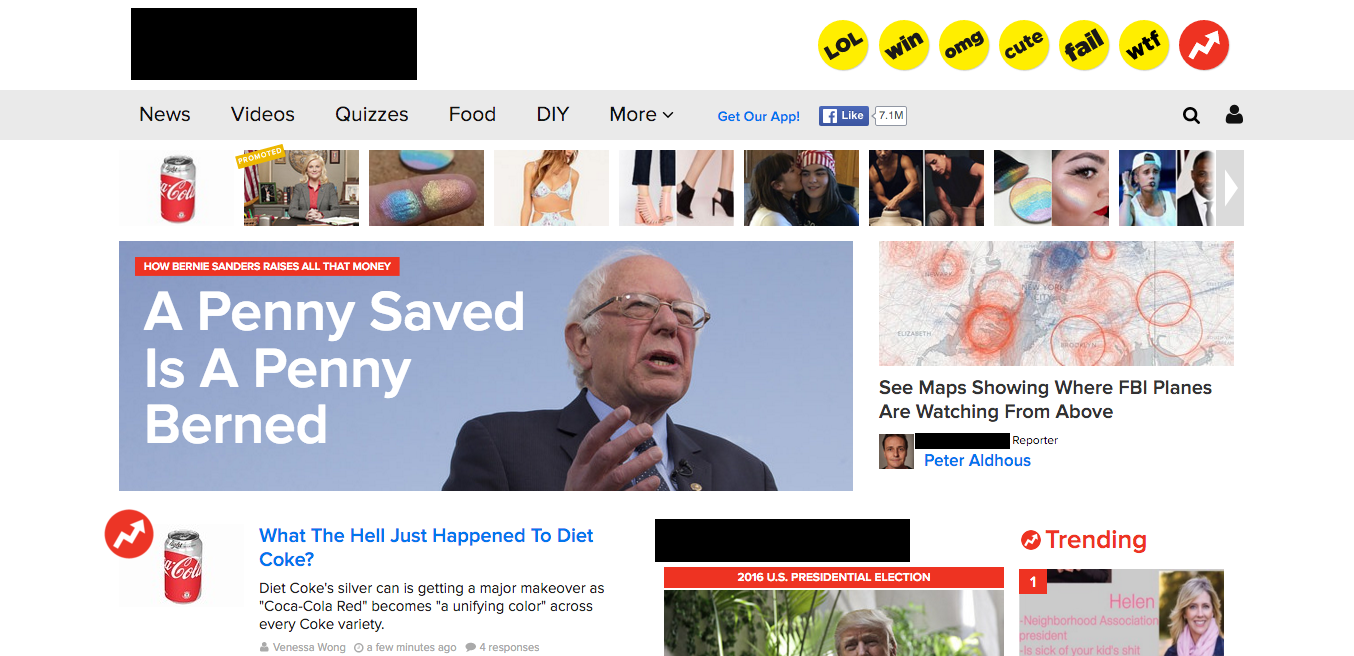 I honestly had a hard time deciding whether to take out the famous red upward pointing arrow here, but after noticing that none of the other publishers had a logo anywhere on their homepage, I figured BuzzFeed deserved the advantage for realizing the power of a good, recognizable logo.
I honestly had a hard time deciding whether to take out the famous red upward pointing arrow here, but after noticing that none of the other publishers had a logo anywhere on their homepage, I figured BuzzFeed deserved the advantage for realizing the power of a good, recognizable logo.
Besides that, everything here is patently BuzzFeed: the buttons at the top, the carousel of trending stories, and the sections themselves—what other publisher would have quizzes, food, and DIY? The result is a homepage that almost everyone can recognize.
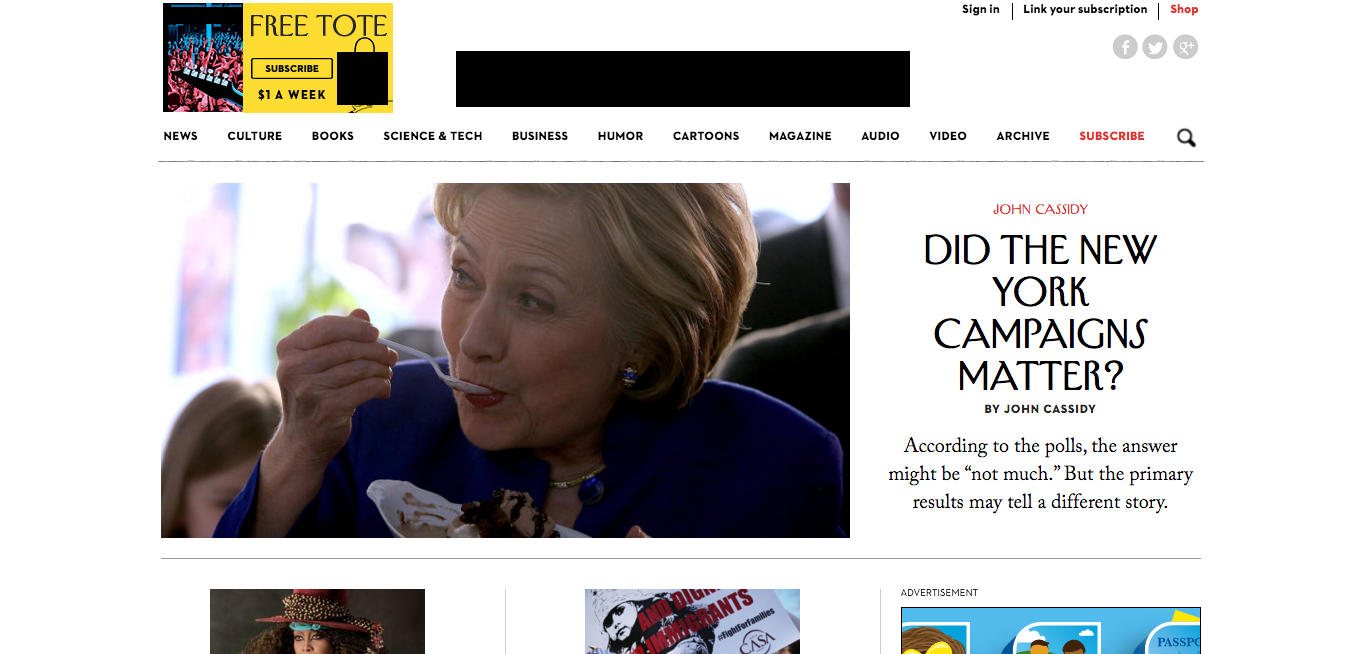 The New Yorker, meanwhile, may be the most renowned magazine on the planet, largely for its eclectic coverage and distinct style. The font itself is famous and very recognizable. Plus, nobody else would include a “Cartoons” section in the top navigation bar.
The New Yorker, meanwhile, may be the most renowned magazine on the planet, largely for its eclectic coverage and distinct style. The font itself is famous and very recognizable. Plus, nobody else would include a “Cartoons” section in the top navigation bar.
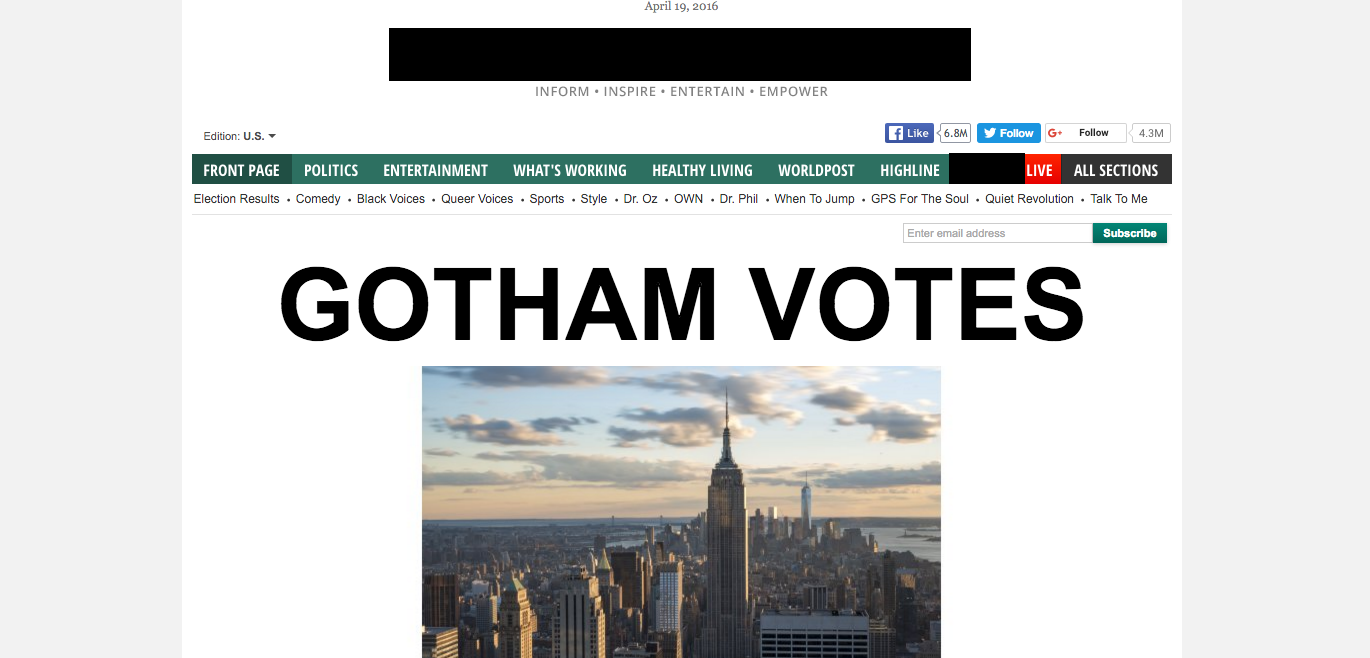 The Huffington Post is famous for running above-the-fold full-caps headlines like this, so it’s not surprising to see it take third. The subsections—Black Voices, Queer Voices, Healthy Living—also hint at the publication’s unapologetic liberal bent.
The Huffington Post is famous for running above-the-fold full-caps headlines like this, so it’s not surprising to see it take third. The subsections—Black Voices, Queer Voices, Healthy Living—also hint at the publication’s unapologetic liberal bent.
Media people are split on Taylor Swift
 When I wrote this quiz, Taylor Swift was all over the Internet. She was in the midst of her 1989 tour, and it was seemingly all everyone could talk about.
When I wrote this quiz, Taylor Swift was all over the Internet. She was in the midst of her 1989 tour, and it was seemingly all everyone could talk about.
That’s toned down a bit, but I think it’s fair to think of Taylor Swift as a stand-in for any name or event guaranteed to bring in clicks. At The Content Strategist, our golden topic is Facebook. For big media blogs, it’s people like Taylor Swift and Beyoncé. And as these results suggest, people are unsure how to feel about these gifts from the click gods.
The media doesn’t love social media billionaires
Rupert Murdoch, founder of Fox News and writer of ill-advised tweets, ranks dead last for favorite media billionaire, tied with Donald Trump. (This quiz came out before the meat of Trump’s presidential run.)
Perhaps more interesting is how low Snapchat co-founder Evan Spiegel and Facebook co-founder Mark Zuckerberg rank. Spiegel has plenty of baggage: He comes from a wealthy family and had distasteful emails from his time as a Stanford frat boy leaked.
Zuckerberg doesn’t have a great reputation either—see: The Social Network—and the fact that every media company has to rely on his company may be engendering some resentment. In other words, it may be a long time till Zuckerberg and the media are BFFs, despite outward appearances.
In the mean time, the media still needs Zuck & Co. if they want their quizzes to go viral, though a Slack chat at BuzzFeed isn’t too bad either.
Image by Danil MelekhinGet better at your job right now.
Read our monthly newsletter to master content marketing. It’s made for marketers, creators, and everyone in between.
